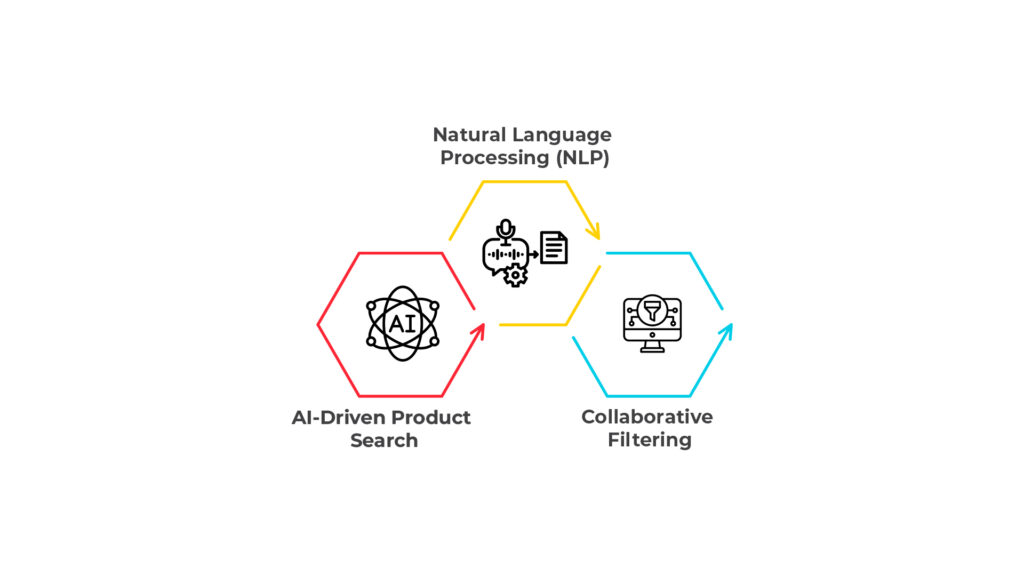Quick Overview
This blog explores the importance of improving e-commerce product search relevance to drive higher conversions. It highlights how AI-driven search algorithms, coupled with Human-in-the-Loop (HITL) approaches, can enhance product discovery, reduce customer frustration, and boost engagement.
Key points include:
- The role of AI in personalizing search results based on user behavior and preferences.
- How HITL helps refine AI-generated results, ensuring accuracy and relevance.
- The impact of catalog management on improving search accuracy and overall user experience.
- Best practices for optimizing eCommerce search to increase customer satisfaction and sales.
Introduction:
We live in a digital-first world, where the success and growth of an eCommerce business depends on how easily and quickly customers can find the right product.
E-commerce product discovery is more complex than just listing items available in your store. It involves planning and enabling search experiences that match user intent. What you need here is an optimized search function that helps a shopper quickly find products relevant to what they are searching for in the current session, what they have already purchased or what is already sitting in their cart. Having such a search function in place leads to higher customer engagement and satisfaction, and eventually, conversions.
Image Suggestion:
Many businesses struggle with search experience optimization and product discovery without the right strategies and tools in place. Poor search results, outdated catalog data, and ineffective search algorithms can lead to frequent cart abandonment and a lost opportunity at making sales.
Here’s where AI product search and eCommerce search algorithms are changing how products are discovered. Incorporating artificial intelligence, machine learning, and natural language processing (NLP) into search solutions leads to accurate, customized search results that happen in a matter of seconds. All of this is because now, there’s a better understanding of user behavior and preferences, and improved search accuracy, all in real time.
Let’s look at some of the factors that determine e-commerce search relevance, the challenges businesses face when it comes to incorporating AI into eCommerce search, and some of the best practices in search experience optimization.
Understanding E-Commerce Search Relevance
Imagine this. You hop on to your favorite online store to buy “tan leather boots”. The search results
- Show you tan leather boots in a wide variety of styles, including ankle-length, knee-high, and cowboy boots
- Suggest products in a price range that is in line with your purchase history on the site
- Rely on smart recommendations by suggesting “similar styles” or “customers also bought”
- Autocorrect any typos in your search

What you see above is called eCommerce search relevance. This, when done effectively, can reduce buyer frustration and increase the chance of a purchase.
The Impact of Search Accuracy on Consumer Behavior
According to a report by McKinsey & Company, almost 80% of all consumers are likely to become repeat customers if a brand or website offers personalized product recommendations. Here is how search accuracy can influence purchase behavior:
- Better Conversion Rates – Enabling users to find the right product quickly through effective search increases the likelihood of them completing their purchase.
- Higher Customer Satisfaction – A tailor-made search experience lays emphasis on the customer instead of in-your-face sales tactics and thus helps build trust and brand loyalty.
- Improves Engagement and Discoverability – Intelligent search functions often lead customers to explore additional related products, add more items to their cart, and increase the average order value.
In contrast, a poor search experience can drive buyers away, and in the event that they repeatedly encounter irrelevant results, they may decide to buy from a competitor’s platform with a more accurate search system.
The Role of Catalog Management in Search Optimization
A product catalog with a defined structure is key to getting seen by eCommerce search algorithms. Catalog management involves indexing, revising, and optimizing product attributes to improve eCommerce product discovery. It ensures that search engines can understand and display the right products when users enter their queries. Detailed and correct product descriptions and attributes, standardized naming conventions, and updated product listings with relevant tags are some signs of effective catalog management.
By investing in catalog management services, businesses can maintain a clean, accurate, and searchable product database, improving the e-commerce search experience and driving higher conversions.
Types of Search Relevance Algorithms
There are different kinds of eCommerce search algorithms that businesses rely on to improve product discovery. eCommerce brands
can use these advanced techniques to refine search results, ensuring customers receive the most relevant product recommendations based on their queries, preferences, and browsing behavior.

AI-Driven Product Search
AI-powered search algorithms make the user experience way better than usual by delivering personalized, context-aware search results. Unlike traditional keyword-based searches, machine learning and deep learning models analyze various aspects of customer data, including browsing history, past purchases, and interaction patterns. This analysis of data results in customized product recommendations and behavior-based shopping predictions. AI can also be integrated with image recognition and voice search technology to provide a better user experience to shoppers.
Retail giants like Amazon use AI-driven search to enhance user engagement, ensuring that shoppers receive relevant results and discover new products effortlessly.
Natural Language Processing (NLP)
Traditional search engines often have difficulty translating vague queries, but NLP-powered semantic search can recognize intent, context, spelling errors, and synonyms. For instance, NLP-powered search algorithms can identify when a shopper is looking for “running shoes under $100” versus “best-rated running shoes.” They can also show search results for sneakers even when a shopper types in “trainers” and these algorithms can differentiate between the fruit “apple” and the brand.
Collaborative Filtering
Collaborative filtering is another popular search algorithm that reads user behavior and purchase history to recommend other products that are relevant to a shopper’s search query. This algorithm can either be user-based, item-based, or a combination of both. It can suggest products similar to what others have bought (user-based filtering) or it can recommend products that are often purchased together (item-based filtering). It also integrates feedback and refines search results by keeping track of user engagement (clicks, views, and time spent). You can frequently see platforms such as Netflix, Spotify, and Amazon use collaborative filtering.
Challenges in E-Commerce Search Optimization
Despite all the new technology available these days when it comes to eCommerce SEO, businesses still face challenges in maintaining search relevance. Addressing these challenges is important if your goal is to improve user experience and get more sales. Some of these challenges include
Poor Search Results
When users receive irrelevant search results due to keyword mismatches, incomplete product data, or generic rankings, it can lead to frustration, higher bounce rates, and lost sales.
Catalog Management Issues
The backbone of any eCommerce business is a well-organized product catalog. Products that don’t follow recognized naming conventions, have outdated listings, or that haven’t been categorized well can be the deal-breaker for your platform. Without structured catalog management, even the most advanced search algorithms will struggle to deliver accurate results. This is why it can be a good idea to fall back on a professional catalog management service so that at least one thing is taken off your plate.
Scalability
As an e-commerce business grows, maintaining search relevance across an ever-expanding product inventory can pose challenges. These can be due to a growing number of SKUs that require advanced indexing methods and computational capabilities. Scalability issues can also arise from multi-category products that require dynamic filtering and ranking systems. In such cases, a catalog management service with scalable infrastructure can help mitigate these challenges, thus maintaining the quality of the shopping experience.
Complex Queries
Search queries can often be ambiguous or conversational, for instance, “What’s the best laptop for college students?”. Shoppers can also use detailed, multi-attribute queries such as “waterproof hiking boots for winter under $150”. These queries require AI or NLP-powered search engines that can interpret user intent accurately because, in such cases, standard search systems are not enough.
Best Practices for Optimizing E-Commerce Search
If you want to improve search experience optimization and encourage conversions, focus on the following best practices.
Data Accuracy in Catalog Management
Keep your product catalog organized and up-to-date. Review and change any inconsistent product names, outdated descriptions, and missing metadata so that you can reduce the chances of your search system showing irrelevant results that can frustrate customers.
Use AI for Personalization
AI-driven search tools can improve the shopping experience by personalizing results based on user behavior, location, and preferences. By analyzing browsing and purchase history, AI suggests relevant products, adjusts search rankings in real-time, and provides geo-targeted recommendations. If you can add a human-in-the-loop (HITL) element into the mix, even better! Retailers using AI personalization see higher engagement and conversion rates as customers receive more relevant and timely product suggestions.
Continuous Testing and Learning
Optimizing e-commerce search is an ongoing process that requires constant trial and testing. Make it a point to A/B test various search algorithms, analyze search logs to understand user behavior, and have a continuous customer feedback loop in place to identify areas for improvement.
User-Friendly Search Filters
Advanced filtering options simplify product discovery, allowing users to find what they need quickly. Implementing filters for price, brand, size, and ratings, as well as dynamic filtering that adapts to the selected product category, improves usability. Offering sorting options based on relevance, popularity, or new arrivals further refines the shopping experience, reducing frustration and leading to a complete buying journey.

Improved Search Algorithms
Refining search algorithms ensures that users receive faster and more relevant results. Features like synonym recognition (e.g., “sofa” vs. “couch”), auto-correction for typos, and machine learning-based ranking help improve accuracy. Prioritizing high-demand products, factoring in reviews, and adjusting for seasonal trends can help build search relevance.
By adopting these best practices, businesses can create an intuitive search experience, leading to higher engagement, improved customer satisfaction, and increased sales.
The Future of E-Commerce Search
E-commerce search is becoming better and more powerful every passing day. Most of this growth can be attributed to AI, machine learning, and other emerging search technologies. With 69% of shoppers relying on website search (as per a report by Nosto), businesses have no choice but to adopt new search solutions that have one goal: product discovery that leads to conversions. Some of these solutions that have great potential to blow up in the future include:
AI Product Search & Machine Learning
AI-powered search transforms shopping by predicting user intent based on browsing behavior (Amazon’s AI-driven search is the reason for more than 35% of its annual sales).
Voice & Visual Search
With digital natives shopping on their smartphones every day, both voice and visual search are becoming widespread (Pinterest Lens sees 600M+ searches monthly). Needless to say, businesses must optimize for conversational, long-tail queries as well as image-based searches.

voice search
Conversational Commerce
AI-powered chatbots like Sephora’s Virtual Artist also play a big role in personalizing shopping experiences by answering natural language queries, recommending products via chat and making it possible to shop within WhatsApp, Messenger, or other website chatbots.
As these technologies continue to grow, so does the entire scope of search experience optimization. eCommerce leaders foresee higher engagement, reduced bounce rates, and increased conversions in the future.
Search relevance is a cornerstone of e-commerce success, directly influencing customer satisfaction, conversion rates, and overall sales. A strategic and optimized search experience ensures that users find the products they need without a hassle, leading to higher engagement and increased purchases.
To remain competitive in the world of AI-enabled eCommerce, businesses must look to invest in catalog management services and advanced search solutions. With their Human-in-the-Loop (HITL) approach, NextWealth’s experts can help you stand out in a sea of companies that use AI to assist in their catalog management. Get in touch to learn more about how we combine the best of both worlds to help your business grow.
Now is the time to take action—start optimizing your product search today and change how customers discover and interact with your brand!
References
https://www.scalacode.com/blog/how-ai-is-transforming-e-commerce-product-recommendations
https://www.bigcommerce.com/articles/ecommerce/catalog-management
https://www.youngurbanproject.com/scope-of-e-commerce
https://www.aboutamazon.com/news/retail/artificial-intelligence-amazon-features-interest

